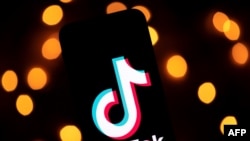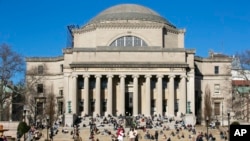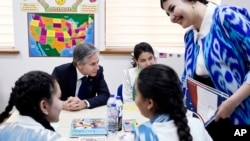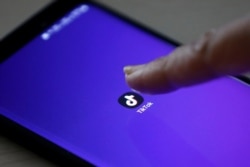Student Union
Quarantined Students Take to TikTok, Stock Up on Noodles

Canned goods.
Video games.
Recreational substances.
In case they are restricted from classes or campus due to the coronavirus, many students have been preparing to be quarantined for a couple weeks.“
I’m stockpiling on ramen,” says Mason Sell, a grad student at George Washington University.
When he found out that at few cases of coronavirus had broken out in Washington, D.C., Sell decided to stockpile on food and cleaning supplies to get him through both a coronavirus outbreak and midterms, which happen to coincide.
“I decided to drive far away from D.C. to get supplies," he said, after seeing people on social media complaining about empty shelves and lines out the doors at some stores.
He drove more than an hour to find a grocery store that was well-stocked.
Armed with laptops, tablets, game consoles and smartphones, millennials and Gen Zers living in quarantine, while physically isolated, continue to be engaged with the outside world.
Students in quarantine are keeping up with their assignments online and continuing their internships remotely. Others, have passed the time watching Netflix, shopping on Amazon, and scrolling through social media.
Leighton Douglas is a third-year architecture student at the University of Notre Dame in Indiana. She is now one of the 106 students from her school who have been sent home from their study-abroad programs in Italy to spend two weeks in self-quarantine.
Her study abroad program in Rome ended abruptly after the U.S. Centers for Disease Control and Prevention (CDC) gave the country a Level 3 Travel Health Notice, indicating that transmission of coronavirus there is ongoing and widespread.
Within 12 hours of the CDC issuing a travel notice, the University of Notre Dame bought a flight home for all of their students in Rome, including Douglas.
While she was still in Rome, Douglas said travelers arriving at city's airport were having their temperatures taken.
However, her experience flying into the United States was quite different.
“We were expecting to have a health screening when we got back, but that just didn't happen," Douglas said. She found that surprising, especially because she noticed “there were definitely people coughing and sneezing on my flight and no one followed up with them.”
Along with her classmates, Douglas has to spend 14 days in self-quarantine and will need to be cleared by a doctor before she is allowed to return to campus. She has spent her time in quarantine in isolation in her room in her parents' home, mostly watching Netflix, building puzzles and patiently waiting for the two weeks to pass.
“Quarantine is a lot of sitting and waiting,” she said.
As the number of quarantined students increases on campuses across the country, some students, particularly those with a higher likelihood of infection compared to others in their age group, would rather be safe than sorry.
Anthea Johnson is a student at the California State University-Long Beach, where 10 students are self-quarantined over fears of COVID-19.
Johnson has circulated a petition asking her school to temporarily change their policies to allow students and faculty members to stay at home without a doctor's note and face no academic consequences.
“Students and faculty who identify as immune-suppressed, or have a household member who is, should be allowed to file for either temporary leave or excused absences for a period of time until the spread calms down,” Johnson wrote on her petition.
In two days, more than 2,500 students signed her petition.
Many in quarantine, especially students in the midst of midterm season, have little to do, so they have found creative ways to pass the time, leading to COVID-19 to go viral on thousands of memes, tweets and TikToks, documenting the virus' spread.
Student Mackenzie Britt has used TikTok -- a popular video app -- to pass the time and document her quarantine.
Britt, student at Loyola University in Baltimore, is studying abroad at the American University of Paris.
After her roommates returned from a trip to Northern Italy, they were placed in quarantine. Because she was in close quarters with her roommates, she joined them.
This led to Britt making a video documenting each day of her quarantine so far. Her TikTok shows her and her roommates checking their temperatures, getting groceries in facemasks, but mostly, just it shows them sitting around.
“I look forward to putting things on TikTok as I don't have much else to do.” Britt said.
Her videos have gone viral online, with her first racking up more than 50,000 likes. Some of her other videos were featured on the widely watched "Good Morning America" television show.
Swiss business student Gaia Pennissi entered quarantine after attending Fashion Week in Milan, which has been hard-hit by COVID-19. Upon returning to Switzerland, she has not been able to attend classes and has placed herself in quarantine.
“I am the type of person who likes to be out and about with other people,” she said. She spends time Facetiming with friends and family. She, too, has used TikTok to document her experience in quarantine, which she has described as more boring than it is hectic.
Madeline Joung contributed to this story.
See all News Updates of the Day
- By VOA News
Michigan State international students get their own space

Michigan State University in East Lansing, Michigan, is setting aside a space in the International Center for international students.
Nidal Dajani, vice president of the school's International Student Association, said that the club plans to use the space to host events and hopes to collaborate with other student groups.
- By Dylan Ebs
International students find community during Pride Month

For LGBTQ+ international students, Pride Month, observed in June, is a unique time to reflect.
They hold on to multiple identities — both their LGBTQ+ identity and their cultural background — but coming to terms with them is not always easy.
For graduate student David Zhou, these identities can feel conflicting as transgender rights in China remain a controversial issue and spaces for LGBTQ people close. Zhou, 25, is transgender and pursuing an education in the STEM field at an urban university in the Midwestern United States.
VOA is using a pseudonym for Zhou’s first name and is not naming his university to protect his identity due to safety concerns back home in China. Zhou is not open about his transgender identity to his family.
During Pride Month, Zhou said he attended multiple LGBTQ+ events in his community and is surrounded by a supportive group of LGBTQ+ students who can relate to his experiences. But he’s not open about his identity to everyone on campus and said he doesn’t disclose his preferred pronouns to everyone to avoid transphobic comments.
“I feel like I have to make some judgments of the character of that person to see if they’re a good person to disclose [my identity] to,” Zhou said.
Zhou’s Pride Month celebrations included attending local markets with LGBTQ+ vendors and hanging out with his LGBTQ+ friends.
“They normalized being trans and for a long time I feel like trans identity is, should I say a vulnerability, brings me fear and worrying about discrimination, but having those events are helpful because it allowed me to see that queer people could just [live] openly,” he said.
At social events where few international students are present, Zhou said it can be tough to fit in.
“There's a lot of times like when they were talking about things I kind of, don't really understand, mostly because I kind of lack some background experience or knowledge,” he said.
Zhou said he is not aware of specific groups for LGBTQ+ international students at his university, but said international students are more prevalent in graduate programs and therefore find representation in organizations for LGBTQ+ graduate students.
In China, transgender individuals must obtain consent from an “immediate family member,” even for adults hoping to transition, which critics say limits the autonomy of transgender individuals while supporters say the policy protects doctors from violence by upset parents.
Struby Struble, a former coordinator of the University of Missouri LGBTQ+ Resource Center, told NAFSA: Association of International Educators in 2015 that LGBTQ+ international students face a “double barrier” on campus.
“With their international student friends, they feel isolated because they’re the LGBT one,” she said. “But then among the LGBT students on campus, they feel isolated because they’re the international one.”
Nick Martin, associate director of the Q Center, Binghamton University’s LGBTQ+ student support office, said when international students tour the center, there’s often a sense of hesitation as they enter a type of space that may not be present in their home country.
“I compare that to a year in after they've come into the space, they've again, maybe come to some of our events, they've got more connected,” he said.
Martin said graduate students have a unique interest in the Q Center as they may use the office for research and advocacy purposes that align with their studies.
“For older students, there may be hesitancy in a different way, but I think it's more in the vein of they want to do some of the advocacy work,” he said.
Martin said he thinks about how both his office and BU’s international student office can support students who come from countries with few — if any — protections for LGBTQ+ individuals.
“It's been a learning process of what those students really need, but I think I've kind of learned that a lot of students are just looking for the safe space that we offer,” Martin said.
- By VOA News
International students discuss US campus culture shock

International students at De Anza College in Cupertino, California, talked about culture shock in an article in La Voz News, the student newspaper.
"It felt like a major culture shock. Everything was so different, from academics to mannerism," said a student from Mexico.
Read the full story here.
These are the most expensive schools in the US

High tuition costs along with housing and food expenses can add up for students at U.S. colleges and universities.
MSNBC looked at the most expensive schools in the country, with one costing more than $500,000 for a bachelor’s degree. (June 2024)
Uzbekistan students admitted into top US universities

Students from Uzbekistan are among the international students admitted to top colleges and universities in recent years.
Gazata.uz profiled some of the Uzbekistan students attending Harvard, Brown, Princeton and other U.S. universities. (June 2024)







